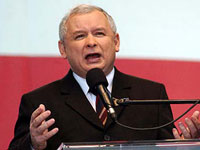Polisch election to influence Prime Minister's fate
Sunday's election can either oust Polish Prime Minister Jaroslaw Kaczynski or return him to office with a strengthened hand. Polls calculate that neither of Poland's largest parties will win a majority.

The tight race between Kaczynski's nationalist, conservative Law and Justice party and the pro-business Civic Platform leaves the door open to a slew of possible alliances, depending who captures top spot in the Sunday vote.
Kacyznski's chief challenger, Donald Tusk of Civic Platform, is aiming for an alliance with the small, farm-based Polish Peasants' Party to reach the magic number of 231 seats in the 460-seat Sejm, or lower house.
"If no party wins a majority to govern alone - and Civic Platform wins the most seats - the most likely coalition is Civic Platform and the Polish Peasants' Party," said Mikolaj Czesnik from the Polish Academy of Sciences. The two parties have cooperated successfully at the local level.
However, Civic Platform is running neck-and-neck in polls with Kaczynski's party, which has shown a talent for pulling out tight election wins. Law and Justice upset Civic Platform in 2005.
A Law and Justice win, analysts say, would likely see Kaczynski try to poach lawmakers from Civic Platform to cobble together a majority. He would need to, because his former coalition partners, the populist Self-Defense and the ultra-Catholic League of Polish Families, appear likely disappear from parliament.
Both parties are rooted in the anti-communist Solidarity movement and are right-of-center, although Civic Platform is more pro-European Union and Law and Justice puts special emphasis on purging communists from public life.
Despite the similarities, Czesnik calls a "grand coalition" between Law and Justice and Civic Platform "fairly unlikely." The parties fought bitterly in the wake of 2005 parliamentary elections, when they failed to agree on an alliance, and ties between the two parties remain tense.
On Wednesday, Tusk accused Kaczynski of using the secret services to dig up dirt on the opposition during the campaign. He also compared Kaczynski to communist-era Interior Minister Gen. Czeslaw Kiszczak and Poland's last communist leader Gen. Wojciech Jaruzelski, both of whom imposed martial law in 1981.
"Leaders that break the principles of democracy and decency against the opposition during a campaign lose elections in Poland," Tusk said. "Just like Jaruzelski and Kiszczak left power, so will Kaczynski."
The new elections are taking place after parliament dissolved last month, two years before it term was due to expire, at the request of Kaczynski, who hoped new elections would end two years of turmoil.
Law and Justice pushed for the vote to try to win more seats and end months of feuding with two small coalition partners. Kaczynski is gambling that he will come out with more seats and a stronger grip on power.
The latest poll by the GfK Polonia agency - carried out Oct. 16 - showed support for Law and Justice at 28 percent, down five points from a similar poll published a day earlier. Civic Platform claimed the top spot with 31 percent support, down two points from a day earlier.
The survey, published Wednesday in the Rzeczpospolita daily, showed the Left and Democrats, or LiD, an alliance of ex-communists and small center-right parties led by former President Aleksander Kwasniewski, inching up three points to 12 percent.
The only other party to enter parliament would be the Polish Peasants' Party, down one point to 6 percent.
Such a result would give Civic Platform 185 seats, well short of the 231 needed for a majority. It would leave a potential Civic Platform coalition with the Peasants 11 seats short of a majority - which perhaps could push Civic Platform to strike a deal with LiD.
Tusk has labored to keep the possibility of an agreement with the ex-communists on the table - without committing himself and opening himself to attacks from Kaczynski that he is dallying with former communists.
The GfK Polonia survey questioned 1,000 adults. It gave no margin of error, but such polls generally have a margin of error of plus or minus three percentage points.
Subscribe to Pravda.Ru Telegram channel, Facebook, RSS!


